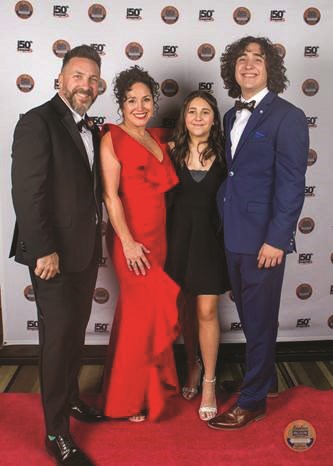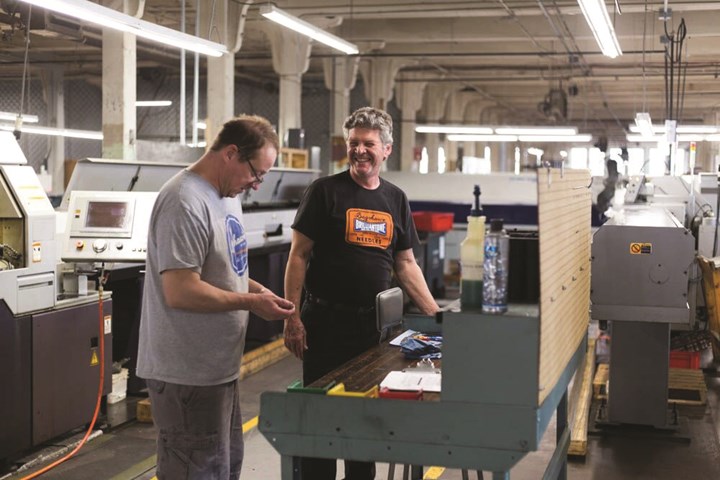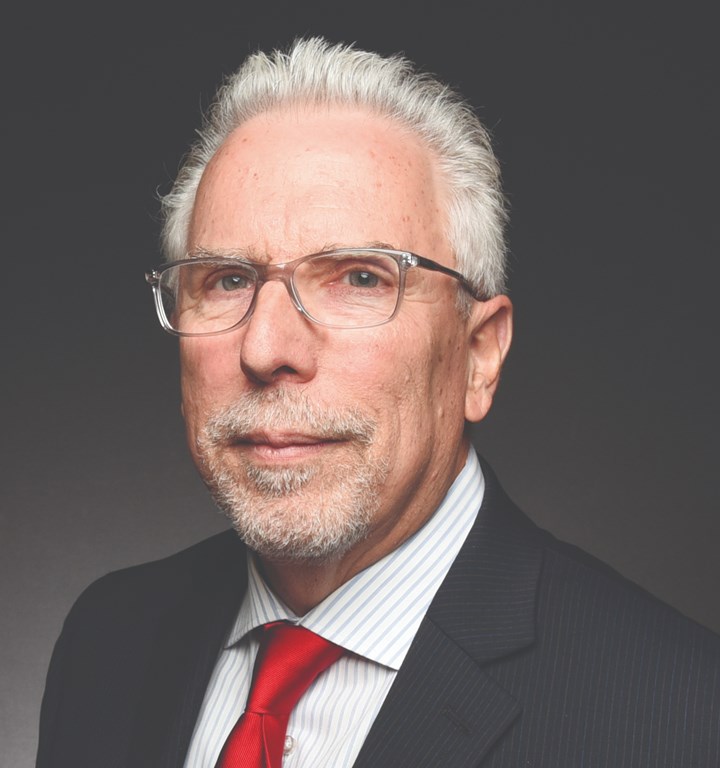W.H. Bagshaw Co. — 150 Years of Precision Machining, Manufacturing Careers, Families and the Community
What lessons can we learn from a precision manufacturing company that has thrived its way through the past three industrial revolutions?
I recently visited W.H. Bagshaw Co. in Nashua, New Hampshire, to help it celebrate 150 years of precision manufacturing. In addition, I presented training and facilitated some conversations- you know, to help the company with its next 150 years.
One hundred and fifty years ago it was 1870. There were no antibiotics. There were no electric lights. The best oil for indoor lighting was whale oil. Think about that for a minute. Think about what that means. Could you afford to run your shop on second and third shift using whale oil lighting?
There was no telephone. And it goes without saying there were no automobiles or paved roads — maybe a cobblestone street in town, here or there. Maybe not. It was the 1880s, before Carl Benz built his first electric tricycle — precursor to today’s Mercedes-Benz and all of the other automobiles that are the basis of our present-day economy.
The last 150 years has seen two industrial revolutions. Steam power and mechanization using non-animal power sources was the first. The second, the technological revolution, resulted from innovations that made steel, petroleum and electricity widely available, leading to a huge blossoming of new powered technologies and mass production. Electric motors first became practical in industry in the 1890s. Those first 20 years at W.H. Bagshaw without electric motors to power operations must have been something.
W.H. Bagshaw took its part in these developments as its patented processes and products as the industries and applications that needed them were developed. It made pins for fabric and cotton recycling and weaving. It made needles for the Edison Phonograph. Imagine getting a purchase order for over a billion and a half needles requiring more steel than the entire U.S. steel industry at the time could produce. And W.H. Bagshaw produced them.

Aaron, Adria, Maya and Kyan Bagshaw
Think of phonograph/Victrola needles as the period’s “iEverything.” It was the only available home entertainment until the popularity of the radio, which became available in the 1920s. That’s 50 years of market for the product without major technological upset. In fact, Bagshaw still produces these needles today.
Careers
We are trying to change the conversation about careers in manufacturing. Most parents want their children to go to college. The W.H. Bagshaw history shows us that manufacturing careers can be rewarding and stable; W.H. Bagshaw provided five generations with a livelihood and many families economic successes were based on their earnings at the W.H. Bagshaw Co.
Families
Families are the real story of human growth, development and evolution. The family is the unit that nurtures and supports our growth as individuals. The family is what helps us all to develop into our best version of ourselves. But it is the family that evolves, not the individual. As the family gets experience living in an urban-cash economy versus a rural-barter economy, and then succeeding in an economy where education and math are needed to succeed, each generation builds on the progress of the others before it. This can be seen in the case of the Bagshaw family itself and in the families the company has employed in its history.
The Bagshaws are not alone, and my visits to other family owned, PMPA member shops show me this same growth with successive generations. Family values are supportive of growth, respectful of talent, and genuinely focused on the highest and best use of the talent available. If a company is going to survive for 150 years, my bet is that it will be a family owned and actively managed business.
Communities
The role of our manufacturing businesses in our communities is probably something not often considered. We are more than good neighbors. We pay our taxes. Perhaps one of our leaders gets a city council or board of education position to make a difference. We are the reason that there are payroll taxes to be paid by our employees. We are the producers — not just of parts, but also of local economies. We have a vested interest in having adequate infrastructure, capable schools and an educated and capable workforce. Our shops are primary producers, economically speaking, in our local economies. And as often as not, we are the preferred employers as well.

Bagshaw employees enjoying a laugh while working on the shop floor.
What Sustains Our Shops?
Careers, family values, community responsibility and workforce stewardship — these are broad aspects typical of our small, closely held precision machining shops which became obvious to me when I visited W.H. Bagshaw. But these do not explain it all. At Bagshaw, I saw that perhaps our firms are successful because we don’t answer to quarterly earnings demanded by the Wall Street investors. Because we keep our focus on our shop, our workforce, our technology, our customers and our markets, we can make decisions not because of urgency, but because of our intimate understanding of our business. Because we are committed to stewardship for the generations yet to come — our families, the families of our workforce, and in our community. At W.H. Bagshaw, I learned that patient capital is an advantage as the world undergoes industrial and technological revolutions and social upheavals unimagined at the founding of our companies.
Yes, technology is important to producing a marketable product. So is having quality systems, patents to protect our inventions and an attitude of innovation. But ultimately, values and the stewardship commitment of patient capital is what makes all of our closely held, precision manufacturers thrive over the long term. These provide the needed foundation for our workforce to operate at their highest and best level.
Are 150 years in your shop’s future? Maybe. Maybe not. But in 150 years, someone is going to be providing critical components to customers — even if we have no idea what those parts will be a component of. In 150 years, there will be demand. Will your shop be there, to supply?
Read more articles from PMPA:
About the Author
Miles Free
Miles Free is the PMPA director of industry affairs with over 40 years of experience in the areas of manufacturing, quality and steelmaking. He helps answer “How?,” “With what?” and “Really?” Miles’ blog is at pmpaspeakingofprecision.com; email: mfree@pmpa.org; website: pmpa.org.
Related Content
Roles of Women in Manufacturing: What I Learned
Over 20 women were featured in the Roles of Women in Manufacturing series, which started in January 2023.
Read MoreOnshoring Weather Report: Strong Tailwinds!
Onshoring, reshoring, nearshoring: these terms are showing up with increasing frequency in the news and online. But is there evidence that these are real?
Read MoreCraftsman Cribsheet No. 121: ISO Turning — What Does it All Mean?
How to make sense of all those different letters and numbers in ISO turning inserts.
Read MoreTurned and Polished Steel Barstock: How It Is Manufactured, How It Impacts Your Shop
Understanding the benefits provided by turned and polished steel barstock and its differences from cold-drawn steel barstock can help you and your team avoid unexpected performance issues.
Read MoreRead Next
A Tooling Workshop Worth a Visit
Marubeni Citizen-Cincom’s tooling and accessory workshop offers a chance to learn more about ancillary devices that can boost machining efficiency and capability.
Read MoreDo You Have Single Points of Failure?
Plans need to be in place before a catastrophic event occurs.
Read More5 Aspects of PMTS I Appreciate
The three-day edition of the 2025 Precision Machining Technology Show kicks off at the start of April. I’ll be there, and here are some reasons why.
Read More






.jpg;maxWidth=300;quality=90)















